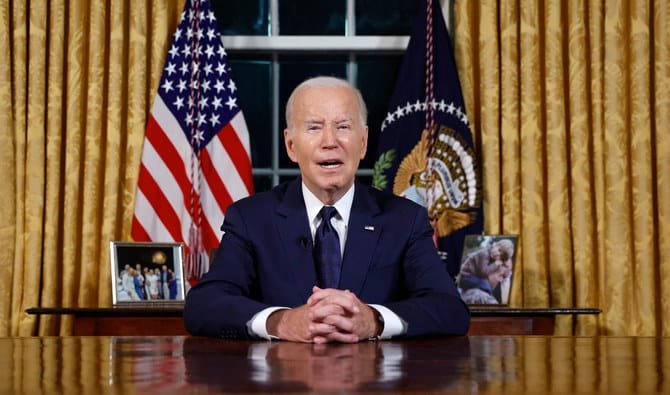President Joe Biden declared Thursday night that it is “vital for America’s national security” for Israel and Ukraine to win their wars, making the case for increased US involvement in a rare Oval Office address as he prepared to ask for billions of dollars in military assistance for both countries.
Biden stated that if international aggression is allowed to continue, “conflict and chaos could spread in other parts of the world.”
“Hamas and Putin represent different threats,” Biden said. “But they share this in common. They both want to completely annihilate a neighboring democracy.”
He stated that he would make an urgent financing request to Congress for approximately $100 billion over the next year. The proposal, which will be revealed on Friday, includes funding for Ukraine, Israel, Taiwan, humanitarian assistance, and border management.
“It’s a smart investment that’s going to pay dividends for American security for generations,” Biden said.
Biden believes that integrating all of these issues into a single bill will build the necessary political coalition for congressional approval. His statement comes the day after his high-stakes trip to Israel, where he expressed solidarity with the government in its fight against Hamas and advocated for increased humanitarian aid to Gazans.
The White House said Biden spoke with Ukrainian President Volodymyr Zelensky ahead of his speech to emphasize the US’s continued support for Kyiv. And, according to a senior White House official, Biden continued to work on his speech on Thursday after consulting with close aides all week, including on his journey home from Israel. Before the president’s speech, the official declined to be identified.
As he attempts to get the funds, Biden faces a slew of difficulties. The Republican majority in the House has been unable to nominate a speaker to replace Rep. Kevin McCarthy, who was removed more than two weeks ago.
Furthermore, as Ukraine’s fight against the Russian invasion near the two-year mark, conservative Republicans reject providing more arms to the country. Despite a personal plea from Zelensky, Biden’s earlier funding request, which included $24 billion to help with the next few months of fighting, was removed from budget legislation last month.
The White House has cautioned that time is running out to prevent Ukraine, which has recently struggled to make progress in a hard counteroffensive, from ceding land to Russia due to depleted military supplies.
When it comes to military support for Israel, which has been shelling the Gaza Strip in response to the Hamas attack on Oct. 7, there will be opposition from the other side of the political spectrum.
Critics have accused Israel of killing civilians indiscriminately and committing war crimes by shutting off basic supplies such as food, water, and gasoline.
Bipartisan support for Israel has already dwindled in recent years as progressive Democrats have become increasingly vocal in their opposition to the country’s decades-long occupation of Palestinian territory, which the international community considers to be illegitimate.
There are also rumblings of discontent within Biden’s administration. Josh Paul, a State Department staffer in charge of the congressional liaison office for foreign arms sales, resigned in protest of the US stance on weapons exports to Israel.
“I cannot work in support of a set of major policy decisions, including rushing more arms to one side of the conflict, that I believe to be short-sighted, destructive, unjust and contradictory to the very values that we publicly espouse,” he wrote in a statement posted to his LinkedIn account.
Paul is believed to be the first official to resign in protest over the administration’s decision to increase military support to Israel in the aftermath of the Oct. 7 incident.
Biden promised Israel during a visit to Tel Aviv on Wednesday that “we will never leave you alone.” However, he warned Israelis not to be “consumed” by wrath, as he said the United States was after the September 11, 2001 assaults.
Wartime decision-making, Biden said, “requires asking very hard questions” and “clarity about the objectives and an honest assessment about whether the path you are on will achieve those objectives.”
A speech from the Oval Office is one of the most prominent platforms a president can command, an opportunity to try to capture the attention of the country during a time of crisis. ABC, NBC, and CBS all stated they would interrupt regular programming to broadcast the speech live.
Biden has only given one other such address during his presidency, when Congress passed bipartisan budget legislation to avoid the country’s debt default.
The White House and other top administration officials, including Office of Management and Budget Director Shalanda Young, have privately briefed key senators on the details of the proposed supplementary budget request in recent days.
The Senate intends to act fast on Biden’s proposal in the hope that it will put pressure on the Republican-controlled House to settle its leadership crisis and resume legislating.
However, there is dispute in the Senate over how to proceed. Eight Republicans, led by Kansas Sen. Roger Marshall, stated that they did not want to include funding for Ukraine and Israel in the same bill.
“These are two separate and unrelated conflicts and it would be wrong to leverage support of aid to Israel in an attempt to get additional aid for Ukraine across the finish line,” they wrote in a letter.
Senator Kevin Cramer of North Dakota said he supports the proposal as long as there is a renewed effort to address border issues. However, he stated, “it’s got to be designed to secure the border, not to facilitate travel through the border.”
Despite a pause in migrant arrivals to the US with the implementation of new asylum restrictions in May, unlawful crossings surpassed a daily average of more than 8,000 last month.
“There’s a huge need to reimburse for the costs of processing,” said Sen. Chris Murphy, a Connecticut Democrat who leads a Senate panel that oversees funding for the Department of Homeland Security. “So it’s personnel costs, it’s soft-sided facilities, it’s transportation costs.”
He was skeptical, however, of any attempt to reform border policy — a traditionally contentious issue — during a budget debate.
“How are we going to settle our differences over immigration in the next two weeks?” Murphy said. “This is a supplemental funding bill. The minute you start loading it up with policies, that sounds like a plan to fail.”
Biden’s inclusion of Taiwan financing in his proposal is a reference to the possibility of another international conflict. China wishes to reunify the self-governing island with the mainland, which may be accomplished through force.
Despite the fact that wars in Europe and the Middle East have been the most pressing problems for US foreign policy, Biden sees Asia as a critical battlefield in the struggle for global power.
According to the administration’s national security policy, which was issued last year, China is “America’s most consequential geopolitical challenge.”





